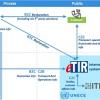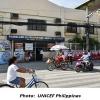Press Releases
Displaying Results 51 - 75 of 80
The digitalization of the “carnet de passages en douane” – or “CPD” system –, which facilitates the temporary importation of private and commercial vehicles, is expected to greatly improve its efficiency, speed and transparency. Through enhanced data management, the digitalized “eCPD” system will
Understanding the conditions of road crashes supports the assessment of how vehicles’ safety equipment performs, which can help to improve these systems to reinforce safety on the road. A new UN Regulation which entered into force on 30 September 2021 will introduce a major breakthrough in
Ensuring that children in Paraguay have safer ways to get to and from schools; strengthening the medical post-crash response in Bangladesh; developing streets for safer and low-carbon mobility of pedestrians and cyclists in East Africa; and strengthening road safety data management and policy
UNECE’s new Transport Statistics Infocard offers a new, user-friendly country-by-country perspective on important transport topics that are needed to inform policy decisions: road safety, numbers of cars and length of railways, alternative fuel use and public transport.
Across the UNECE region
Habtamu Zerihun is a 38-year old father to three daughters, aged 4, 6 and 12 years. Habtamu used to be a construction worker in and around Addis Ababa, until he was hit by a pickup on his walk to work. The pickup driver was under the influence of stimulant drugs and there were no adequate
The United Nations Economic Commission for Europe (UNECE) and the European Investment Bank, the financial investment arm of the European Union, have signed today a Memorandum of Understanding (MoU) to strengthen joint efforts to promote economic cooperation, cohesion and to support countries in the
Two new United Nations Vehicle Regulations will reduce the number and severity of collisions between vehicles moving off from a stationary position or in reverse manoeuvre at low speed, and pedestrians and cyclists. They build on the provisions adopted in 2018 introducing Blind Spot Information
Despite decades of discussions on the challenges and intersections between gender and transport, progress has been slow in implementing a gender perspective in transport policies. This has been problematic, for example, in urban planning which fails to recognise the different travel patterns
The new legal framework for the full digitalisation of the TIR system (the so-called eTIR) enters into force today, opening eTIR to 77 countries across five continents.
This landmark change will allow for completely paperless cross-border transit of goods, under the customs guarantee of the TIR
Today, European countries adopted the Vienna Declaration to spur the transformation towards clean, safe, healthy and inclusive transport and mobility, with a strong focus on promoting cycling across the pan-European region.
The Vienna Declaration was signed at the end of the Fifth High-level
As one of the most sustainable, inclusive, safe, and healthy forms of mobility, cycling received a major boost today with the adoption of the first-ever Pan-European Master Plan for Cycling Promotion at the Fifth High-Level Meeting on Transport, Health and Environment (THE PEP). The Master Plan is
Speed kills. A child hit by a car at 30 km/h (20 mph) can survive. Hit at 80 km/h (50 mph), most will die. “Streets for Life” is the slogan chosen for the 6th United Nations Global Road Safety Week (UNGRSW) to be launched this 17 May 2021, calling for 30 km/h (20 mph) speed limits to be the norm
The use of material resources, fuelled by economic and population growth, urbanisation and societal changes, has increased more than ten times since 1900 and is set to double again by 2030. The annual global extraction of materials has increased from 27 to 92 billion tonnes since 1970, while the
Localizing the Sustainable Development Goals at the urban level is crucial to deliver on the 2030 Agenda, stresses UNECE in a new report that advocates for a “cities-based” and “people-smart” approach to sustainable development.
With cities today as the driving force in economic, social,
More robust monitoring and measuring systems are required to meet the Sustainable Development Goals (SDGs), according to a UNECE report on Measuring and Monitoring progress towards SDGs that uses a “nexus” approach to chart a course for more “joined up” activities.
High-quality statistics
Recognizing the vital importance of mobility and connectivity for sustainable economic development and taking stock of key challenges, UNECE has consolidated its work in this cross-cutting area to help countries leverage its tools to steer recovery efforts towards the Sustainable Development Goals
Countries of the Pan-European region can seize the COVID-19 recovery as a turning point for green and healthy transport and mobility as a foundation to build a better future for all, urges a UN Task Force.
Bringing together over 50 experts from member States, international institutions, academia
The legal provisions providing the legal basis for the complete digitalization of the United Nations TIR Convention (the so-called eTIR) - the only global customs transit system, facilitating trade and the seamless and secure movement of goods across borders –will enter into force on 25 May 2021
Intelligent Transport Systems can unlock major benefits in terms of safety, efficiency and environmental performance for mobility and the movement of goods. But with the rapid pace of innovation, ensuring interoperability and harmonization of technological solutions between countries remains a key
Transport leaders from around the world have called for urgent and concerted action to address systemic vulnerabilities exposed by the COVID-19 pandemic, which caused widespread disruption to transport connectivity and supply chains. Gathering for the 83rd session of the UNECE Inland Transport
As the world enters in a new Decade of Action for Road Safety 2021-2030, the UN Road Safety Fund (UNRSF) announces the successful completion of two of pilot projects demonstrating the potential of targeted and coordinated action to save lives in low- and middle-income countries, where 90% of the 1.
Three landmark UN vehicle regulations adopted last June by the World Forum for Harmonization of Vehicle Regulations entered into force on 22 January 2021, as notified by the United Nations Secretary General.
The three Regulations are applicable in the 54 countries that are Parties to the 1958
The Transport, Health and Environment Pan-European Programme (THE PEP), jointly serviced by the UNECE and the WHO Regional Office for Europe, will hold its Fifth High-Level Meeting from 17 to 18 May 2021. The Fifth High-Level Meeting was due to be held in November 2020 in Vienna; however, due to
Over the past 20 years, international and national vehicle regulations have introduced increasingly stringent ceilings on particulate emissions (PM 2.5 and 10) from vehicles’ exhaust.
As a result, according to the emission inventories submitted by countries to UNECE’s Convention on Long-range
According to national statistics, road traffic deaths in Ethiopia more than doubled between 2007 and 2018, rising from 2,161 to 4,597. Ethiopia loses 13 people per day, or one person every two hours, to road traffic crashes. Given the magnitude of the road safety challenge, which constitutes a


























